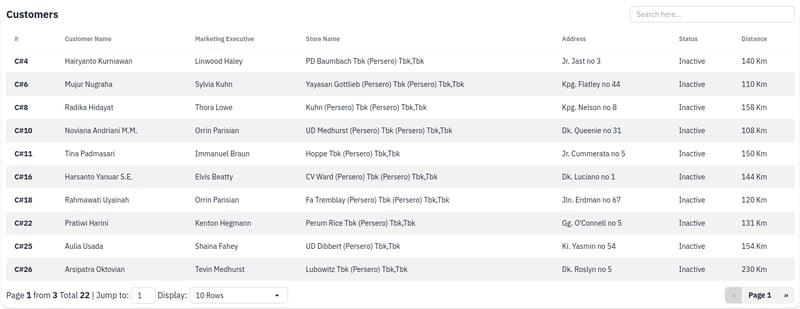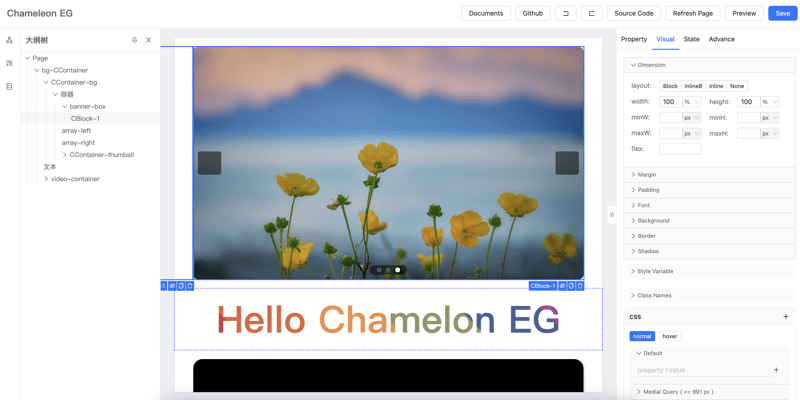Aaaaaaaaaaaaaaahhh… (sorry, I just wake up!). Hey! What’s goin punk! Did you still playing the hates song while you writing code? Btw, get some coffee and sit down please. Let’s talk about what I’ve done this week! This is soooooooooo wonderful!
I just did TursoSyncd and doing freestyle with my fck PHP Framework and HTMX. Yes! HTMX with X, I’ve done writing my own DataTables (like) using PHP + HTMX + MySQL.
Building table and especially a DataTable is insanely annoying for me and myself! But I love doing some boring stuff and take more time to mess up and walk in to the dead zone (to looking myself as a Handsome and stupid person in the earth).
Is that interactive? Like React Table by TanStack?
Yes, but not a fully features like TanStack have. This is my personal preferences. So hate me please…
So what kinda stuff you have?
Hold on, hold on… lemmee show you…
<div class=“overflow-x-auto” id=“customers-table”>
<div class=“flex absolute justify-center items-center -mt-2 -ml-2 w-full h-full rounded-lg bg-zinc-400 bg-opacity-35 -z-10 htmx-indicator” id=“table-indicator”><?= Icons::use(‘HxIndicator’, ‘w-24 h-24’) ?></div>
<div class=“flex flex-row justify-between mb-3”>
<h2 class=“card-title”>Customer Approval</h2>
<input
type=“search”
name=“search”
placeholder=“Search here…”
id=“search”
value=“<?= $customers[‘search’] ?>“
class=“w-80 input input-sm input-bordered focus:outline-none”
hx-get=“<?= base_url(‘customers?’ . http_build_query(array_merge($currentPage, [‘column’ => ‘customers.customerId’]))) ?>“
hx-trigger=“input changed delay:500ms, search”
hx-swap=“outerHTML”
hx-target=“#customers-table”
hx-indicator=“#table-indicator”
autocomplete=“off”
/>
</div>
<table class=“table table-zebra”>
<thead>
<tr>
<th <?= buildHxAttributes(‘customers’, $customers[‘queryString’], ‘customers.customerId’, $customers[‘activeColumn’], ‘customers-table’) ?>>#</th>
<th <?= buildHxAttributes(‘customers’, $customers[‘queryString’], ‘customers.customerName’, $customers[‘activeColumn’], ‘customers-table’) ?>>Customer Name</th>
<th <?= buildHxAttributes(‘customers’, $customers[‘queryString’], ‘profiles.firstName’, $customers[‘activeColumn’], ‘customers-table’) ?>>Marketing Executive</th>
<th <?= buildHxAttributes(‘customers’, $customers[‘queryString’], ‘customers.customerStoreName’, $customers[‘activeColumn’], ‘customers-table’) ?>>Store Name</th>
<th <?= buildHxAttributes(‘customers’, $customers[‘queryString’], ‘customers.customerAddress’, $customers[‘activeColumn’], ‘customers-table’) ?>>Address</th>
<th class=“cursor-not-allowed”>Status</th>
<th class=“cursor-not-allowed”>Distance</th>
</tr>
</thead>
<tbody>
<?php foreach ($customers[‘data’] as $customer) : ?>
<tr>
<th>C#<?= $customer->customerId ?></th>
<td><?= $customer->customerName ?></td>
<td><?= $customer->firstName . ‘ ‘ . $customer->lastName ?></td>
<td><?= $customer->customerStoreName ?></td>
<td><?= $customer->customerAddress ?></td>
<td><?= $customer->isActived ? ‘Active’ : ‘Inactive’ ?></td>
<td>
<?php
$customerSource = explode(‘,’, $customer->customerCoordinate);
$appSource = explode(‘,’, ‘-7.7682121,110.4083341’);
echo round(Utils::haversine(
[
‘lat’ => $customerSource[0],
‘long’ => $customerSource[1],
],
[
‘lat’ => $appSource[0],
‘long’ => $appSource[1],
]
)) . ” Km”;
?>
</td>
</tr>
<?php endforeach; ?>
</tbody>
</table>
<div class=“flex flex-row justify-between mt-3”>
<p>
Page <span class=“font-bold”><?= $customers[‘currentPage’] ?></span> from <span class=“font-bold”><?= $customers[‘totalPages’] ?></span> Total <span class=“font-bold”><?= $customers[‘totalRows’] ?></span> |
Jump to: <input type=“number” name=“pageNumber” id=“pageNumber” hx-on:change=“var url = ‘<?= base_url(‘customers?’ . http_build_query(array_merge($prevPage, [‘column’ => ‘customers.customerId’, ‘search’ => ”]))) ?>‘;
var replacedUrl = url.replace(/page=d+/, ‘page=’ + this.value);
htmx.ajax(‘GET’, replacedUrl, {target: ‘#customers-table’, swap: ‘outerHTML’})” class=“w-12 input input-sm input-bordered” min=“1” max=“<?= $customers[‘totalPages’] ?>“ value=“<?= $customers[‘currentPage’] ?>“ hx-indicator=“#table-indicator” />
Display: <select
class=“w-48 select select-bordered select-sm”
hx-indicator=“#table-indicator”
hx-on:change=“var url = ‘<?= base_url(‘customers?’ . http_build_query(array_merge($prevPage, [‘column’ => ‘customers.customerId’]))) ?>‘
var pageNumber = parseInt(‘<?= $prevPage[‘page’] ?>‘) == 0 ? 1 : parseInt(‘<?= $prevPage[‘page’] ?>‘)
var replacedUrl = url.replace(/limit=d+/, ‘limit=’ + this.value);
htmx.ajax(‘GET’, replacedUrl.replace(/page=d+/, ‘page=’ + pageNumber), {target: ‘#customers-table’, swap: ‘outerHTML’})
“>
<option <?= $customers[‘limit’] == 10 ? ‘selected’ : ” ?> value=“10”>10 Rows</option>
<option <?= $customers[‘limit’] == 20 ? ‘selected’ : ” ?> value=“20”>20 Rows</option>
<option <?= $customers[‘limit’] == 30 ? ‘selected’ : ” ?> value=“30”>30 Rows</option>
<option <?= $customers[‘limit’] == 40 ? ‘selected’ : ” ?> value=“40”>40 Rows</option>
<option <?= $customers[‘limit’] == 50 ? ‘selected’ : ” ?> value=“50”>50 Rows</option>
</select>
</p>
<div class=“join”>
<button class=“join-item btn btn-sm” <?= hxPagination(‘customers’, http_build_query(array_merge($prevPage, [‘column’ => ‘customers.customerId’])), ‘customers-table’) ?> <?= ($customers[‘currentPage’] <= 1) ? ‘disabled’ : ” ?>>«</button>
<button class=“join-item btn btn-sm”>Page <?= $customers[‘currentPage’] ?></button>
<button class=“join-item btn btn-sm” <?= hxPagination(‘customers’, http_build_query(array_merge($nextPage, [‘column’ => ‘customers.customerId’])), ‘customers-table’) ?> <?= $customers[‘currentPage’] >= $customers[‘totalPages’] ? ‘disabled’ : ” ?>>»</button>
</div>
</div>
</div>
😲 The f is that?!! Are you kidding me??!
🤣 No… but I mean yes! But… That’s only the HTML Stucture with HTMX stuff and PHP Code. I will break down it to you. Please give me more loud volume for your hated song…
Markup #1: The Search Field
type=“search”
name=“search”
placeholder=“Search here…”
id=“search”
value=“<?= $customers[‘search’] ?>“
class=“w-80 input input-sm input-bordered focus:outline-none”
hx-get=“<?= base_url(‘customers?’ . http_build_query(array_merge($currentPage, [‘column’ => ‘customers.customerId’]))) ?>“
hx-trigger=“input changed delay:500ms, search”
hx-swap=“outerHTML”
hx-target=“#customers-table”
hx-indicator=“#table-indicator”
autocomplete=“off”
/>
What you see? Yes, the f hx- attribute!
hx-get to issues a GET to the specified URL
hx-swap to controls how content will swap in (outerHTML, beforeend, afterend, …)
hx-target to specifies the target element to be swapped
hx-indicator the element to put the htmx-request class on during the request
Read: HTMX Reference
That’s the spirit of this freestyle in my messy code! Is this interesting? Just said “yessssss….” for me!
Markup #2: The th Section
<th <?= buildHxAttributes(‘customers’, $customers[‘queryString’], ‘customers.customerId’, $customers[‘activeColumn’], ‘customers-table’) ?>>#</th>
<th <?= buildHxAttributes(‘customers’, $customers[‘queryString’], ‘customers.customerName’, $customers[‘activeColumn’], ‘customers-table’) ?>>Customer Name</th>
<th <?= buildHxAttributes(‘customers’, $customers[‘queryString’], ‘profiles.firstName’, $customers[‘activeColumn’], ‘customers-table’) ?>>Marketing Executive</th>
<th <?= buildHxAttributes(‘customers’, $customers[‘queryString’], ‘customers.customerStoreName’, $customers[‘activeColumn’], ‘customers-table’) ?>>Store Name</th>
<th <?= buildHxAttributes(‘customers’, $customers[‘queryString’], ‘customers.customerAddress’, $customers[‘activeColumn’], ‘customers-table’) ?>>Address</th>
<th class=“cursor-not-allowed”>Status</th>
<th class=“cursor-not-allowed”>Distance</th>
</tr>
😕 Dude! Come on… what the punk is that buildHxAttributes?
That’s PHP Function to generate htmx attribute that I need to sorting-order the data by column. Here is the code look like…
{
$hxAttributes = ‘hx-get=”‘ . base_url($base_url . ‘?’ . $queryString . ‘&column=’ . $column . ‘&search=’ . $search) . ‘” ‘;
$hxAttributes .= ‘hx-swap=”outerHTML” ‘;
$hxAttributes .= ‘hx-target=”#’ . $targetId . ‘” ‘;
$hxAttributes .= ‘hx-indicator=”#table-indicator” ‘;
$hxAttributes .= ‘class=”cursor-pointer ‘;
if ($activeColumn === $column) {
$hxAttributes .= ‘bg-base-300 ‘;
}
$hxAttributes .= $extraClasses . ‘”‘;
return $hxAttributes;
}
😲 Ooooooooooohhh…
Can I…
😲 Yes please…
Markup #3: The Trampoline
<input
type=“number”
name=“pageNumber”
id=“pageNumber”
hx-on:change=“var url = ‘<?= base_url(‘customers?’ . http_build_query(array_merge($prevPage, [‘column’ => ‘customers.customerId’, ‘search’ => ”]))) ?>‘;
var replacedUrl = url.replace(/page=d+/, ‘page=’ + this.value);
htmx.ajax(‘GET’, replacedUrl, {target: ‘#customers-table’, swap: ‘outerHTML’})”
class=“w-12 input input-sm input-bordered”
min=“1”
max=“<?= $customers[‘totalPages’] ?>“
value=“<?= $customers[‘currentPage’] ?>“
hx-indicator=“#table-indicator”
/>
Did you just write PHP and JavaScript inside the attribute like this, inline?
var url = ‘<?= base_url(‘customers?’ . http_build_query(array_merge($prevPage, [‘column’ => ‘customers.customerId’, ‘search’ => ”]))) ?>‘;
var replacedUrl = url.replace(/page=d+/, ‘page=’ + this.value);
htmx.ajax(‘GET’, replacedUrl, {target: ‘#customers-table’, swap: ‘outerHTML’})
”
Yes… that’s call “use client & server”;, sorry I am joking! Please give me_ 👏 👏 👏
Markup #4: Display Limit
This is the select options field to allow user choose limit data that displayed in the table. Hmmmm… sound promising! 🤣
class=“w-48 select select-bordered select-sm”
hx-indicator=“#table-indicator”
hx-on:change=“var url = ‘<?= base_url(‘customers?’ . http_build_query(array_merge($prevPage, [‘column’ => ‘customers.customerId’]))) ?>‘
var pageNumber = parseInt(‘<?= $prevPage[‘page’] ?>‘) == 0 ? 1 : parseInt(‘<?= $prevPage[‘page’] ?>‘)
var replacedUrl = url.replace(/limit=d+/, ‘limit=’ + this.value);
htmx.ajax(‘GET’, replacedUrl.replace(/page=d+/, ‘page=’ + pageNumber), {target: ‘#customers-table’, swap: ‘outerHTML’})
“>
<option <?= $customers[‘limit’] == 10 ? ‘selected’ : ” ?> value=“10”>10 Rows</option>
<option <?= $customers[‘limit’] == 20 ? ‘selected’ : ” ?> value=“20”>20 Rows</option>
<option <?= $customers[‘limit’] == 30 ? ‘selected’ : ” ?> value=“30”>30 Rows</option>
<option <?= $customers[‘limit’] == 40 ? ‘selected’ : ” ?> value=“40”>40 Rows</option>
<option <?= $customers[‘limit’] == 50 ? ‘selected’ : ” ?> value=“50”>50 Rows</option>
</select>
Aaaaaaaaaaand again! JavaScript code inside the attribute value 😄 this is funny right!?
Markup #5: The Pagination
<button class=“join-item btn btn-sm”>Page <?= $customers[‘currentPage’] ?></button>
<button class=“join-item btn btn-sm” <?= hxPagination(‘customers’, http_build_query(array_merge($nextPage, [‘column’ => ‘customers.customerId’])), ‘customers-table’) ?> <?= $customers[‘currentPage’] >= $customers[‘totalPages’] ? ‘disabled’ : ” ?>>»</button>
This markup will display group buttons left display prev icon and middle the current page and next icon. Also I create a PHP Function called hxPagination just for fun!
{
$hxAttributes = ‘hx-get=”‘ . base_url($base_url . ‘?’ . $queryString) . ‘” ‘;
$hxAttributes .= ‘hx-swap=”outerHTML” ‘;
$hxAttributes .= ‘hx-target=”#’ . $targetId . ‘” ‘;
$hxAttributes .= ‘hx-indicator=”#table-indicator” ‘;
return $hxAttributes;
}
Eeeeh…. nothing fancy here! Of course… it’s just markup! Wawawaiiiit… special markup with “x” 😄
Everything is defined and setup (maybe) correctly! Now I need to create a router, controller, and the model
The Router
// Filename: fck-htmx/routes/web.php
use FckincoreApplication;
/** @var Application $app */
$app->router->get(‘/’, ‘Customers@datatable’);
Router done!
The Controller
// Filename: fck-htmx/controllers/Customers.php
namespace Appcontrollers;
use AppconfighelpersUtils;
use AppmodelsCustomers as ModelsCustomers;
use FckincoreController;
use FckincoreRequest;
use FckincoreResponse;
class Customers extends Controller
{
protected $customers;
public function __construct()
{
$response = new Response();
if (!isAuthenticate()) {
$response->setStatusCode(401);
exit();
}
$this->customers = new ModelsCustomers();
}
public function datatable(Request $request)
{
$customers = $this->customers->notActiveDataTables(
$request->getQuery(‘column’),
strtoupper($request->getQuery(‘order’)),
$request->getQuery(‘page’),
$request->getQuery(‘limit’),
$request->getQuery(‘search’)
);
$direction = $request->getQuery(‘order’) === ‘asc’ ? 0 : 1;
$params = [
‘customers’ => [
…$customers,
‘search’ => $request->getQuery(‘search’),
‘activeColumn’ => $request->getQuery(‘column’),
‘order’ => $direction,
‘page’ => (int) $request->getQuery(‘page’),
‘limit’ => (int) $request->getQuery(‘limit’),
‘queryString’ => http_build_query([
‘order’ => $direction === 0 ? ‘desc’ : ‘asc’,
‘page’ => $request->getQuery(‘page’),
‘limit’ => $request->getQuery(‘limit’)
])
]
];
return Utils::addComponent(‘dashboard/partials/customers.approval/table’, $params);
}
}
Controller is done!
The Model
// Filename: fck-htmx/models/Customers.php
namespace Appmodels;
use FckincoredbModel;
use PDO;
class Customers extends Model
{
public function notActiveDataTables(string $column = ‘customers.customerId’, string $order_by = ‘ASC’, int $page = 1, int $limit = 10, string $search = ”): array
{
$limit = empty($search) && $limit >= 10 ? 10 : $limit;
$offset = ($page – 1) * $limit;
$sql = “SELECT
customers.*,
users.*,
roles.*,
profiles.*
FROM
customers
JOIN users ON customers.userId = users.userId
JOIN roles ON users.roleId = roles.roleId
JOIN profiles ON profiles
.userId = users.userId
WHERE
customers.isActived = 0 AND (
customers.customerName LIKE ‘%{$search}%’ OR profiles.firstName LIKE ‘%{$search}%’ OR profiles.lastName LIKE ‘%{$search}%’
)
ORDER BY
{$column} {$order_by}
LIMIT {$offset}, {$limit}“;
$results = $this->query($sql);
$totalRows = $this->executeQuery(‘customers_all_is_inactive’)->rowCount();
$totalPages = ceil($totalRows / $limit);
return [
‘currentPage’ => $page,
‘nextPage’ => min($page + 1, $totalPages),
‘totalPages’ => $totalPages,
‘offset’ => $offset,
‘totalRows’ => $totalRows,
‘data’ => $results->fetchAll(PDO::FETCH_OBJ)
];
}
}
Model is done!
That’s it! Here the result!




